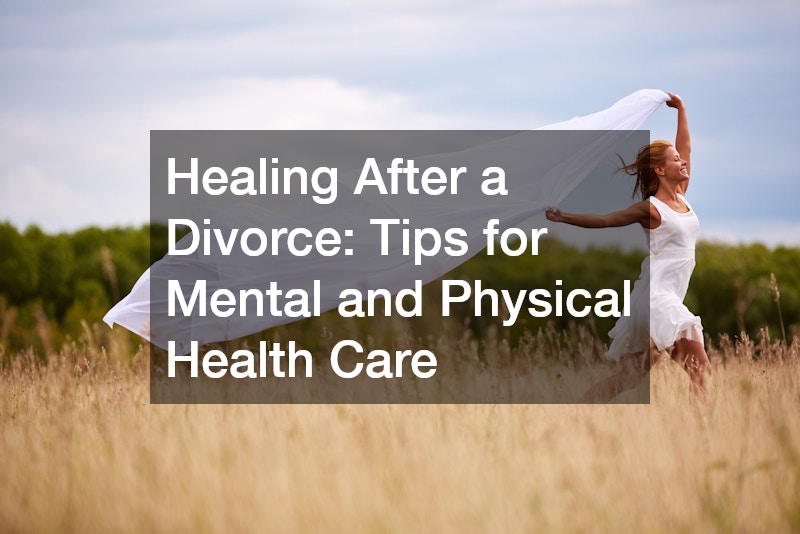Experiencing a divorce is an emotional and tumultuous process, impacting both mental and physical health. Addressing these areas of healing after a divorce is crucial for moving forward effectively. Let’s explore strategies for nurturing your well-being during this significant life transition to empower you to emerge stronger than ever.

Accept Your Reality
Accepting your reality and healing after a divorce can be one of the most challenging parts of the healing process. It’s normal to feel a range of emotions—shock, anger, sadness, or even relief—but the first step in healing is acknowledging the changes that are now a part of your life. Moving out of a shared home often symbolizes the end of the marriage, making the situation feel even more final.
This shift can stir feelings of grief or fear of the unknown, but it also opens the door to personal growth. Accepting that the relationship is over doesn’t mean forgetting the good times or dismissing the emotions you feel. Rather, it’s about coming to terms with the fact that life is changing, and that’s okay. Avoiding the reality of the situation can lead to prolonged suffering, while acceptance can bring clarity.
Moving out and establishing a new living space can be an opportunity for a fresh start. While it may feel overwhelming at first, embracing the new environment allows you to create a space that reflects who you are as an individual, not just who you were as part of a couple. It’s a chance to build routines and habits that support your mental and physical health, focusing on what you need to feel balanced and whole.
It’s important to give yourself grace during this time. Moving forward doesn’t happen overnight, and healing is not a linear process. Accepting your new reality might feel uncomfortable, but it’s a necessary step to finding peace and beginning the next chapter of your life. Trust that in time, you’ll create a fulfilling life post-divorce.
Acknowledge Your Emotions
One of the first steps for healing after a divorce is to acknowledge and accept your emotions. This means allowing yourself to feel sadness, anger, or relief without judgment, as each emotion is a vital aspect of the healing process. It’s normal to have a mixture of feelings; recognizing them can be incredibly liberating.
Working with a divorce lawyer often triggers a range of emotions, from frustration to anticipation. While legal matters require attention, it’s crucial to simultaneously address your emotional needs. By doing so, you avoid falling into the trap of emotional suppression, which can have adverse long-term effects.
Processing emotions is not a swift journey, but a journey that requires patience and honesty with oneself. Engaging in reflective practices such as journaling can be a beneficial outlet. By documenting your experiences and emotions, you gain clarity and understanding, ultimately aiding in your personal growth.
Find a Professional Mental Health Counselor
Seeking professional mental health support can be pivotal for your recovery process as you’re healing after a divorce. Engaging in TMS therapy services offers a modern approach to treating mental health conditions that may arise or worsen after a divorce. These services provide a non-invasive, effective method for addressing depression and anxiety.
Finding a therapist who resonates with you can be instrumental in navigating the complexities of post-divorce life. A counselor provides a safe space to explore your feelings and thoughts while offering strategies for coping with stress and transitioning into single life. Their guidance can lead to profound insights into personal patterns and behaviors.
If in-person therapy isn’t feasible, consider alternative options such as telehealth sessions, which make mental health care more accessible. Taking this step is an investment in your well-being, making it more manageable to confront challenges and rebuild your life with a strong foundation.

Prioritize Physical Health
Caring for your physical health is as vital as nurturing your mental well-being after a divorce. Consulting with a doctor for regular check-ups helps maintain physical health, offering peace of mind during a turbulent time. Ensuring that routine health concerns are addressed prevents avoidable complications.
Treat yourself to cosmetic dental services if you’ve been neglecting your dental health; an enhanced smile can boost confidence and well-being. After a divorce, it is important to engage in actions that promote self-worth and self-care. Furthermore, maintaining physical health can have positive repercussions on your mental state, creating a cycle of overall improvement.
Balancing emotional turbulence with measures that strengthen your body is vital. Incorporating simple activities such as stretching or taking daily walks builds resilience against stress and fatigue. By prioritizing physical health, you empower yourself to face life post-divorce with renewed energy and strength.
Develop a Support System
No one should face divorce alone, and building or reconnecting with a support system is essential for healing after a divorce. Start by reaching out to friends or family members whom you trust to provide love and empathy without judgment. Creating a network of people who understand your situation can be incredibly comforting.
An effective support system can also include professional networks, such as your lawyer’s connections to groups for recently divorced individuals. These can offer structured support, sharing experiences with others who can relate to your situation. Additionally, joining community groups or clubs can introduce you to new people who may offer fresh perspectives and friendships.
Active engagement with your support system also encourages accountability in your healing process. By sharing your journey with others, you gain the strength to overcome difficult moments.
Engage in Mindfulness Practices
Incorporating mindfulness practices into your daily routine can significantly benefit both your mental and physical health post-divorce. Mindfulness encourages presence and acceptance, allowing you to navigate your emotions with less judgment. Activities like meditation, yoga, or spending time in a high-quality garden bed can promote peace and clarity.
Creating a hobby barn or simply spending time on a favorite hobby can serve as a mindfulness exercise, offering relaxation and purpose. This break from stress provides a necessary recharge, enhancing your ability to handle future challenges. Mindfulness practices also cultivate gratitude, which can shift focus from what’s been lost to what still brings joy.
Mindfulness is about finding moments to center yourself amidst life’s chaos. By practicing these habits, you create a mental space to process emotions constructively. Healing after a divorce through mindfulness can lead to greater emotional regulation and resilience during this transitional stage.

Set New Goals
Setting new goals gives direction and motivation for the future, helping to move past the pain of divorce. Start with small, achievable objectives to create a sense of accomplishment and slowly build up to more significant aspirations. This process aligns with building confidence and self-esteem.
Consider areas of personal and professional development, such as taking a class or learning a skill. New goals foster growth and self-improvement, reinforcing the fact that life is filled with possibilities beyond just romantic relationships. Focused growth can lead to discovering new passions and a renewed sense of self-worth.
Setting and achieving goals lets you redefine your identity outside of your former relationship. In doing so, you carve a path for self-discovery and empowerment, enabling a future with renewed purpose and optimism.
Make Your Home Cozier
Your home environment plays a critical role in your healing after a divorce. Engaging a landscape designer can modify outdoor spaces, transforming them into serene retreats for relaxation. Being in a comfortable and attractive environment can significantly reduce stress, promoting feelings of safety and comfort.
Redesigning interiors to better suit your personal taste fosters a sense of ownership and newfound independence. Small changes, such as rearranging furniture or adding decorative pieces, can reinvigorate your living space. Each change mirrors your journey toward becoming a well-rounded, independent individual.
A cozy home acts as a haven, providing shelter and solace during tumultuous times. A supportive environment aligns with and fortifies your emotional and physical well-being.
Focus on Self-Care
Self-care is paramount when healing from a divorce, providing the time and space needed for personal recuperation. This might include visiting a facial balancing doctor to enhance self-image and self-esteem. Acts of self-care serve as reminders that you deserve patience and kindness towards yourself.
Establish a routine catering to your needs, integrating activities that nourish body and mind. Regular indulgences in activities such as spa days, quiet reading, or nature walks can be restorative.
Self-care practices are personal and should be adjusted to fit what feels best for you. Identifying and embracing what makes you feel good helps you reconnect with who you are at your core. In prioritizing self-care, you maintain a balanced approach to healing, fortifying both mind and body.

Stay Active and Exercise
Physical activity is an important component of managing stress and promoting mental well-being as you’re healing after a divorce. Incorporating exercises into your routine helps you retain a healthy lifestyle, invigorating your sense of well-being. Activities ranging from yoga to running can be tailored to fit individual fitness levels.
Consider treatments like laser hair removal to improve your body confidence and enhance your exercise experiences. Feeling comfortable in your skin can motivate regular physical activity, enriching life with vitality and energy. Each workout becomes a constructive expression as you channel stress and emotion into movement.
Regular exercise releases endorphins, creating a natural sense of happiness and reducing stress. This boost in mood can alleviate feelings of depression or anxiety, contributing positively to your mental health. By staying active, you nurture a holistic approach to healing, integrating physical and emotional well-being.
Limit Negative Self-Talk
Limiting negative self-talk is essential to foster a healthy mindset as you’re healing after a divorce. Engage in compassionate self-dialogue and replace detrimental thoughts with empowering affirmations. Positive self-reflection encourages a more balanced outlook on personal growth and self-discovery.
Luxurious indulgences such as trying on luxury swimwear can encourage self-appreciation and confidence-boosting. As you embrace this outlook, self-love and acceptance transform into foundational pillars during healing.
Regularly examining and challenging prevailing negative thoughts can significantly shift your perspective. Identifying and understanding their origin helps dilute the impact they have on your self-esteem. With progress and time, these practices reinforce mental and emotional health.
Make Time for Friends and Family
As you’re healing after a divorce, it’s easy to feel isolated or overwhelmed by the changes in your life. That’s why making time for friends and family is so essential. These relationships can provide the emotional support you need to navigate the healing process. Spending time with people who care about you offers comfort and reminds you that you are not going through this alone.
Friends and family can also help you reconnect with your sense of self outside of the marriage. Whether it’s grabbing coffee, going for a walk, or simply having a heart-to-heart, these interactions offer valuable moments of connection that can lighten your emotional load.
It’s important to lean on those who genuinely support you and your well-being. Be open about your feelings when you’re ready, but also let them bring positivity and distraction into your life. Their encouragement can boost your confidence and provide perspective as you begin to rebuild your life. Remember, your social connections are part of your healing process. By maintaining these relationships, you can find joy, rediscover your individuality, and create new memories as you move forward after divorce.

Give Yourself Time to Heal
Healing after a divorce is not linear and allowing yourself time to heal is crucial. It’s important to acknowledge that recovery involves ups and downs, and it is perfectly normal to need rest periods along the journey. Be patient, extending empathy towards yourself as you navigate this transition.
Allowing yourself time to heal also means understanding that activities or outcomes may look different than expected, which is perfectly acceptable. Accepting that not every day will be perfect can lead to more rewarding experiences.
As you journey through emotional and physical healing, treat yourself with compassion. An investment in time and patience ultimately leads to a constructive and meaningful future. Each day becomes a step further on the road to healing, illuminating paths to a renewed and thriving existence.
Healing after a divorce is an intricate journey that requires attention to both mental and physical health. Prioritizing self-care through various practices—from engaging in mindfulness to setting new goals—will aid in overcoming challenges. Remember that recovery is personal and, above all, your well-being deserves patience and care as you advance toward a brighter future.

